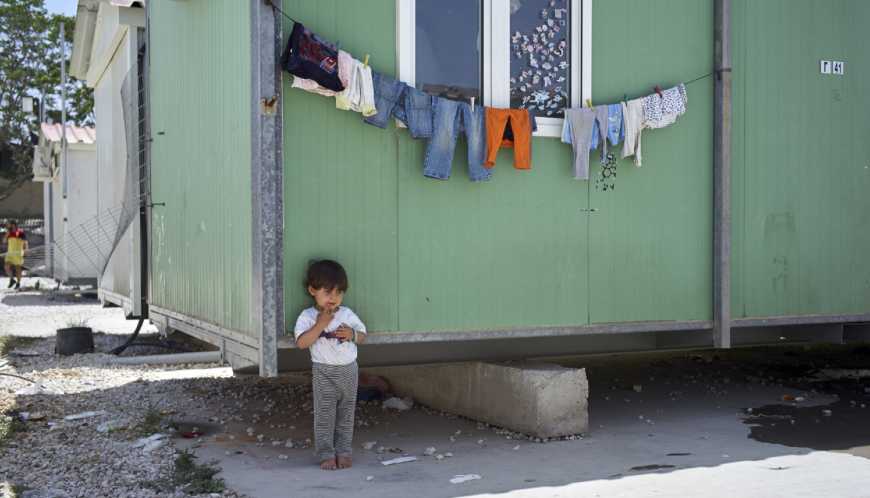On 2 July 2020, the Special Representative on Migration and Refugees Ambassador Drahoslav Štefánek, launched the handbook “Family reunification for refugee and migrant children - standards and promising practices”. The handbook focuses on the reunification of families with children, in particular for unaccompanied and separated refugee and migrant children. The purpose of the handbook is to encourage discussions in member states on potential or already existing solutions for obstacles and challenges to restoring family links. “In the absence of sustainable relocation agreements, family reunification remains a feasible legal pathway to decongest facilities in frontline countries and to promote effective asylum procedures throughout the continent. It is a vital tool to ensure respect for children’s rights and their best interests”, said the Special Representative at the launching event. The launch was opened by Christos Giakoumopoulos, Director General of Human Rights and Rule of Law of the Council of Europe, and the Commissioner for Human Rights, Dunja Mijatović, made a keynote speech. Among the speakers at the webinar, Ms Pegah Moulana, British Youth Council representative to the Advisory Council on Youth at Council of Europe, shared her own experience in going through family reunion. The handbook contributes to the implementation of the objectives of the Action Plan on Protecting Refugee and Migrant Children in Europe (2017-2019) objectives. Background information.
On 1 July 2020, the revised mandate of the Special Representative was published to reflect developments and among others, his role in the operation of the Network of Focal Points on Migration. Apart from the tasks, the mandate includes the need for continued dialogue and assistance.
On 19 June 2020, ahead of World Refugee Day on 20 June, the Council of Europe launched a HELP/UNHCR free online course on Alternatives to Immigration Detention with the aim of supporting legal and other professionals working on migration. “Alternatives to immigration detention become more and more accepted because they have proven to be cost-effective, but above all, using alternatives, states can process efficiently the cases of children and families on the move, in a humane and a human-rights compliant environment. This course is a good example of a tailor-made tool which considers both legal and practical aspects of alternatives to the detention of migrants,” the Special Representative said. The course is based on the Council of Europe’s CDDH Analysis and Practical Guide on Alternatives to Immigration Detention and has been produced jointly by the Independent Human Rights Bodies Division and the Human Rights Education for Legal Professionals (HELP) Programme of the Council of Europe. It has been developed under the Council of Europe Action Plan on Protecting Refugee and Migrant Children with the support of the Office of the Special Representative of the Secretary General on Migration and Refugees and in collaboration with the Office of the United Nations High Commissioner for Refugees (UNHCR).
On 17 June 2020, the Special Representative Ambassador Drahoslav Štefánek published a video where he summarises the Council of Europe´s response in safeguarding the human rights of refugees, migrants and asylum seekers during? the Covid-19 pandemic. In the video, he mentions, inter alia, the joint Council of Europe -Fundamental Rights Agency publication on the main fundamental rights safeguards applicable at member states’ external borders, the CPT Statement of principles relating to the treatment of persons deprived of their liberty, the European Committee of Social Rights statement on the right to protection of health in times of pandemic crisis and the toolkit issued by Secretary General of the Council of Europe, Marija Pejčinović Burić, for governments across Europe on respecting human rights, democracy and the rule of law during the COVID-19 crisis.
In addition, the Special Representative participated in several online events, such as the UK Parliament Web conference on “Protecting unaccompanied child refugees: enabling relocations and preventing human trafficking”. The conference was co-chaired by the Earl of Dundee, Chair of the PACE Sub-Committee on Refugee and Migrant Children and the Lord Dubs, Member of the OSCE PA Ad Hoc Committee on Migration. He also represented the Council of Europe in the meeting of Frontex Consultative Forum on Fundamental Rights. Topics of discussion focused on border protection and human rights, training, and the Fundamental Rights Officer´s draft opinion on Frontex technical and operational assistance to member states in the area of unaccompanied children. The Council of Europe´s contribution to the opinion of the Consultative Forum on the Fundamental Rights Strategy was also presented.
Other on-line events included: European Commission against Racism and Intolerance (ECRI) Webinar on Inclusive Education in Times of Covid-19, the INGO webinar “Migrants and refugees facing the Covid-19 crisis, what lessons for the post-pandemic time?”, the European Parliament webinar “The need to renew Schengen”, the consultative meeting “Supporting Young Refugees in Transition to Adulthood through Youth Work and Youth Policy, the 17th meeting of the Council of Europe Gender Equality Commission and the HELP Annual Network Conference.



